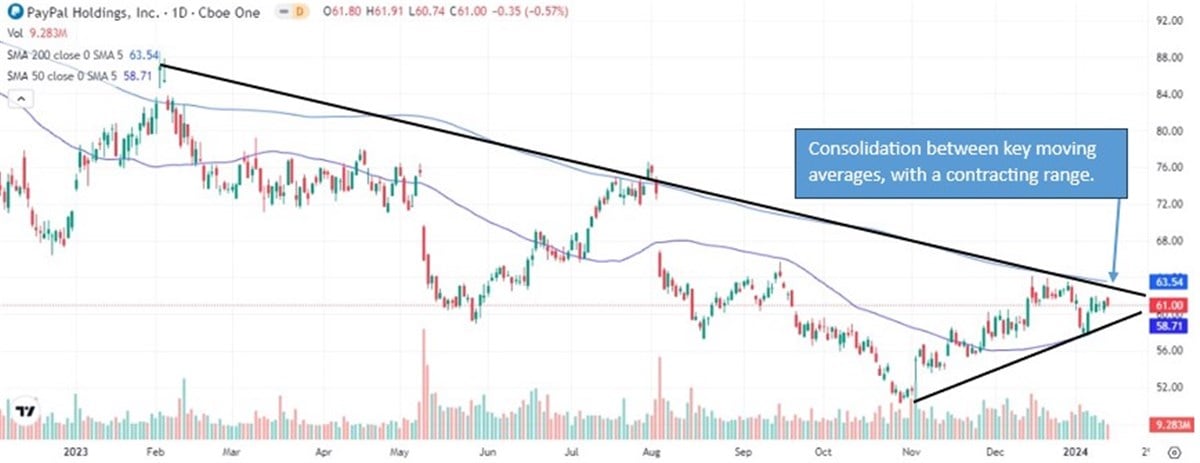
Few names outperformed PayPal Holdings Inc. (NASDAQ: PYPL) during the COVID-19 pandemic. Imagine a company that not only weathered the storm of the COVID-19 pandemic but thrived amidst the chaos, making waves in the world of digital payments.
It was early 2020, and as the world grappled with unprecedented challenges, PayPal's business experienced a surge. The pandemic became a catalyst, propelling not just PayPal but many internet companies to new heights. Total payment volume (TPV), revenue and active accounts skyrocket in 2020 and 2021, resulting in a notable uptick in the stock price. Between March 2020 and February 2021, its stock surged over 250%.
However, the economic and financial landscape is dynamic and ever-changing. Economic headwinds hit PayPal hard in 2022 and continued into 2023. Inflationary pressures and higher interest rates are formidable obstacles, stunting the once meteoric growth. The third quarter of 2023 witnessed an 8.4% year-over-year revenue gain, a far cry from the robust 20%-plus growth in the preceding years. Softer macroeconomic conditions shadow consumer discretionary spending, a niche in which PayPal specializes.
Yet, a glimmer of hope has emerged amidst the challenges. A robust economic backdrop could spell a new chapter for PayPal in 2024. Shareholders are banking on the Federal Reserve, making strategic rate cuts yearly. If this happens, a ripple effect could boost consumer confidence and spending, accelerating PayPal's growth metrics and buoying the stock price.
So, zooming in on the present, let's explore the analyst ratings that shape the narrative around the stock and analyze PayPal's chart, as it looks to be shaping up for a potential breakout.
Analysts mixed on PayPal
Ahead of the company's next earnings release, set for Wednesday, February 7, analysts have been mixed. Based on 35 analyst ratings, PayPal now has a Hold rating. That rating has been reduced over the previous three months to a moderate buy and its consensus price target.
Three months ago, the stock had a price target of $89.27, which has since been reduced to $74.48. Despite the reduction in optimism, its current consensus price target still sees a 22.10% upside for the stock.
Most recently, since the start of the year, three analysts have taken action on the stock.
On January 4, Oppenheimer downgraded PayPal from "outperform" to "market perform." On January 5, BTIG Research shifted its rating for the stock from a Buy to a Neutral rating. On January 9, Morgan Stanley changed its rating for PYPL from "overweight" to "equal weight" and slashed its price target from $118 to $66.
As a result of the recent trend in analyst ratings over the past several months, the stock is now on the most-downgraded list, a list of companies downgraded by analysts most frequently during the last 90 days.
However, despite the mixed and potentially bearish sentiment, the chart might be setting up for a breakout.
PayPal consolidates between key moving averages
Despite the shifting sentiment among analysts covering the stock, the fintech giant's current setup and price action point toward a potential breakout.

Since December last year, the stock has reclaimed its rising 50-day simple moving average (SMA). Since reclaiming it, PYPL has spent time consolidating between its 50-day and 200-SMA, with the latter now serving as resistance. If the stock can break above its 200-day SMA and the downtrend's resistance, a breakout might be confirmed, and the stock might begin its turnaround.





